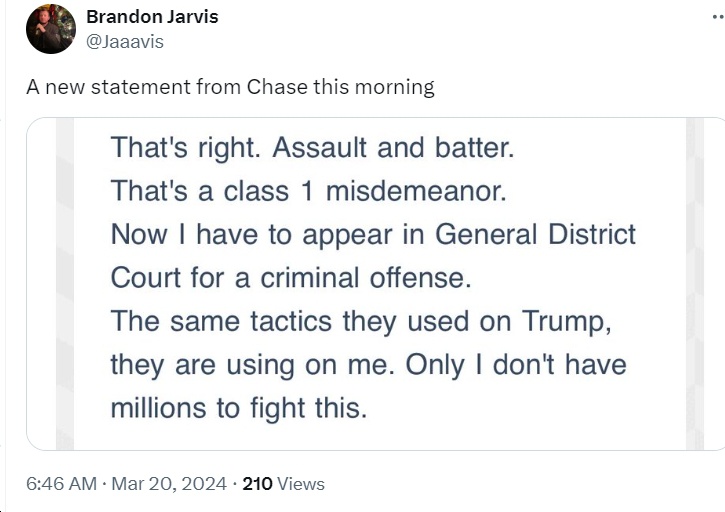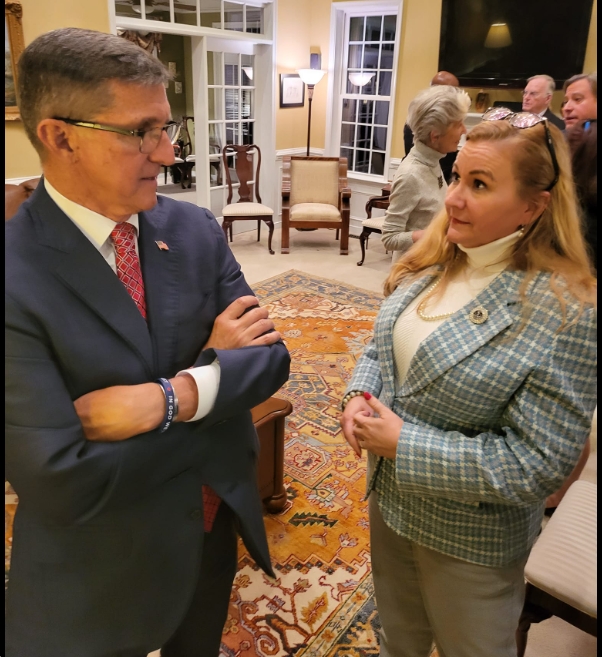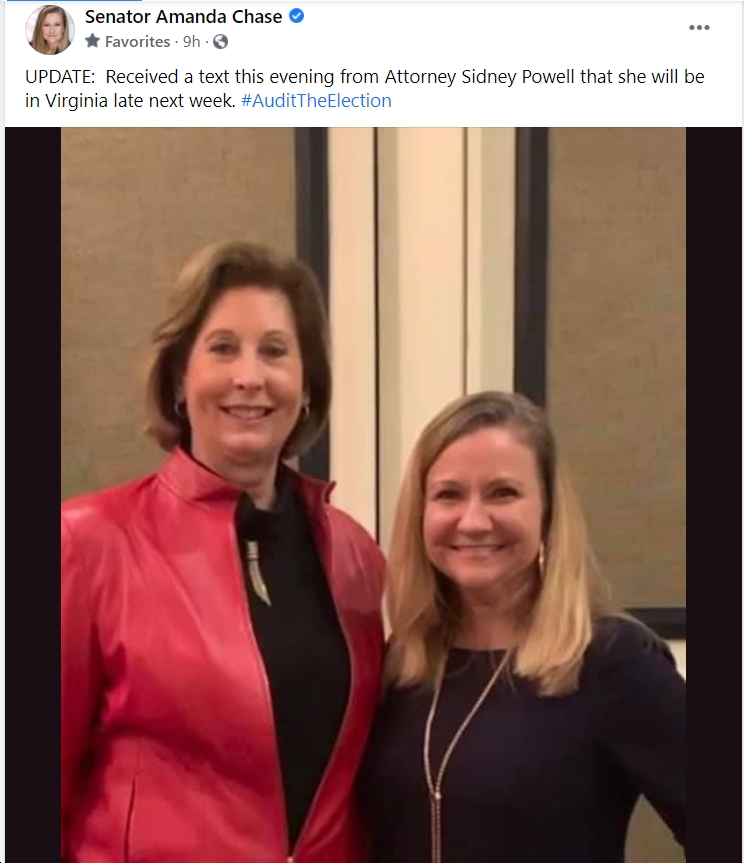In Vetoing Probation Reform Aimed at Reducing Recidivism, Youngkin “has ignored Virginia’s values of compassion and second chances.”
From Del. Katrina Callsen (D-Charlottesville) and State Sen. Barbara Favola (D-Arlington):
|
|
|
From Del. Katrina Callsen (D-Charlottesville) and State Sen. Barbara Favola (D-Arlington):
|
|
|
by Lowell
Here are a few international, national and Virginia news headlines, political and otherwise, for Friday, March 22.
From President Joe Biden reelection campaign:
|
NEW AD: Trump Wants to Talk About ‘Four Years Ago,’ So Let’s Talk About It |
|
Donald Trump and his campaign keep asking voters, “Are you better off than you were four years ago.” The short answer? Yes. Today, Team Biden-Harris released a new ad, reminding voters about what their lives actually looked like four years ago: March Madness canceled, stockpiling toilet paper, businesses shut down, proms called off, as thousands of loved ones passed every single day. |
 |
|
Trump wants to talk about ‘four years ago?’ Let’s talk about it:
Biden-Harris 2024 Spokesperson Ammar Moussa released the following statement: “Let’s talk about four years ago: under Trump’s egregious mismanagement, hundreds of thousands of Americans died who didn’t have to, crime shot up, our economy crashed, he fomented violence in the streets, and he even told us to inject ourselves with bleach. “Americans remember March Madness, proms, weddings, and celebrations being canceled, waiting in line for toilet paper and essentials, businesses shutting down, and losing loved ones – all because Trump failed to prepare for and then couldn’t lead when we needed him the most. “The only thing to happen four years ago to make Americans’ lives better was Donald Trump losing to Joe Biden.” |
|
### Paid for by Biden for President |
From the Joe Biden for President campaign:
|
Not a Winning Campaign: Broke Don Hides in Basement Trump can’t raise money, isn’t campaigning, and is letting convicts and conspiracy theorists run his campaign |
|
We have questions for the political pundits and prognosticators regarding Republican candidate for President Donald Trump and his general election strategy: 1) LACK OF FUNDING: Is not raising the funds needed to reach voters or even campaign a good strategy? Is trailing your opponent in cash on hand by nearly 4 to 1 and hitting up donors to help cover your own personal debts instead of funding your campaign a winning formula for November? CNN: Former President Donald Trump’s campaign and joint fundraising committee together brought in $20.3 million in February and entered this month with a combined $41.9 million cash on hand, according to a Trump campaign official. But the amounts trail far behind the $53 million that President Joe Biden and Democrats previously announced raising in February and the massive $155 million in available cash that Biden’s team said it amassed with its affiliated committees. 2) NOT CAMPAIGNING: Is not campaigning – as your opponent relentlessly campaigns in battleground states – and hiding in your basement a good way to assemble a winning coalition of voters? CNN: Joe Biden has been to every top battleground state but one since the Super Tuesday primaries. Donald Trump has held one rally in a battleground state in those two and a half weeks, and shifted another to Ohio, in part to save on costs. He has also played in two golf tournaments at his Palm Beach golf club, among other activities at his club 3) BAD MESSAGING: Is it good when your senior advisers are freaking out about bad news coverage (cutting Social Security and Medicare, banning abortion, and violent rhetoric) and openly admitting your candidate is letting “crazies” into your inner circle? Politico: On a call with staff on Friday, a senior Trump campaign adviser lamented some of the recent news coverage, saying it had been a bad press week for the campaign, according to two people with knowledge of the call and granted anonymity to describe a private conversation. Axios: Sidelined characters from former President Trump’s past campaigns — “crazies,” some of his top advisers call them — are reattaching themselves to his inner circle now that he’s locked up the Republican nomination. Biden-Harris 2024 Spokesperson Ammar Moussa released the following statement on Trump’s campaign: “We are two weeks into the general election and Donald Trump can’t raise money, is hiding at his country club, and is letting convicts and conspiracy theorists take over his campaign. That is not a winning strategy.” |
|
### Paid for by Biden for President |
|
FOR IMMEDIATE RELEASE |
|
Following Trump’s Lead, House Republicans Endorse A National Abortion Ban … Again |
|
Following Donald Trump’s repeated endorsements of a national abortion ban, House Republicans are again embracing a national abortion ban. But that’s not where they’ll stop: New reporting shows MAGA Republicans are waging a war against reproductive health care, and detailed all of their cruel plans in their new budget. This comes on the heels of Trump Republicans’ blocking a national IVF protection bill that would guarantee every American the right to access in vitro fertilization services. Key Point: “A caucus representing most House Republican lawmakers endorsed a 15-week national abortion ban on Wednesday. The announcement came one day after former President Donald Trump indicated that he could support a 15-week abortion ban.” … “The RSC document goes further: It endorses a 15-week national abortion ban, as well as legislation that could eliminate access to in vitro fertilization, or IVF.” … “The budget plan from the RSC also applauds the ‘Life at Conception Act, which would provide 14th amendment protections at all stages of life.’ As CNN reported last month, the bill ‘does not include a carveout for IVF,’ and ‘reproductive rights activists worry the legislation — if ever passed — would have a chilling effect on IVF clinics.’” Read more below: Rolling Stone: House Republicans Endorse National Abortion Ban [Andrew Perez, 3/21/24] A CAUCUS REPRESENTING most House Republican lawmakers endorsed a 15-week national abortion ban on Wednesday. The announcement came one day after former President Donald Trump indicated that he could support a 15-week abortion ban. The Republican Study Committee (RSC), which includes nearly 80 percent of all House Republicans, released its 2025 budget proposal on Wednesday, titled “Fiscal Sanity to Save America.” Despite being billed as a budget plan, it is a highly ideological document. “The gift of life is precious and should be protected,” the document states, adding that the “RSC celebrates the Dobbs v. Jackson Women’s Health Organization decision.” In that case, the Supreme Court overturned federal protections for abortion rights, using the 6-3 conservative supermajority that Trump helped create. The RSC document goes further: It endorses a 15-week national abortion ban, as well as legislation that could eliminate access to in vitro fertilization, or IVF. […] The RSC budget “applauds” a series of “measures designed to advance the cause of life,” including the “Protecting Pain-Capable Unborn Children from Late-Term Abortions Act, which would prohibit abortions after 15 weeks.” […] The budget plan from the RSC also applauds the “Life at Conception Act, which would provide 14th amendment protections at all stages of life.” As CNN reported last month, the bill “does not include a carveout for IVF,” and “reproductive rights activists worry the legislation — if ever passed — would have a chilling effect on IVF clinics.” The RSC’s support for the Life at Conception Act comes in the wake of a controversial Alabama Supreme Court decision finding that embryos created using IVF are people in the eyes of the law and covered under the state’s wrongful death statute. |
Yesterday, Cindy/VAPLAN came out with her eagerly anticipated, annual progressive scorecard for all Virginia General Assembly members. As always, there is a TON of information to digest in all of this. Of course, as Cindy has pointed out, there are numerous caveats to these scores, for instance that members “have different opportunities to vote on various bills, by virtue of the committee assignments they have.” I’d also add that different members have different roles, with those in leadership, for instance, not necessarily working to optimize their OWN scores, but instead (or at least somewhat) focusing on racking up wins for the “team.” Regardless, Cindy/VAPLAN does amazing work, with the scorecard she produces every year being the most authoritative/definitive one out there for the Virginia legislature (also note: Cindy follows the Virginia General Assembly arguably closer than almost anyone else in Virginia, and maybe in the country when it comes to state legislatures).
With that, I wanted to compare the 2024 VAPLAN scores to district “leans,” along the lines of what Progressive Punch has been doing for years. Basically, the thinking is to try and measure how progressive a member’s voting record is compared to how progressive one would have expected that record to be, all else being equal, based on the progressive “lean” of each member’s district.
To measure the district’s “leans,” I took the 2017 margins in each district for Mark Herring. I used that metric because I wanted a relatively generic statewide race to compare things to, without a third-party candidate or strong “native son” effect (e.g., Northam in the Hampton Roads area). Also note that the redistricting “special masters” in their final memo on 12/7/21 used the 2017 Attorney General’s race to evaluate their newly drawn districts. Of course, 2017 was a strong “blue wave” election year, so one could argue that we should use another statewide election year, such as 2021 (which was a strong Republican year), but in the end, there’s simply no way to find the “perfect” comparison year, and regardless, all the members’ scores are *relative* to their district leans, and then ranked accordingly, so it might not make much of a difference anyway.
I then ranked the districts based on Mark Herring margins, giving an expected progressive rank, and compared those numbers to VAPLAN’s actual progressive rankings for each legislator. Finally, I produced the following graphics (click on them to enlarge), which show how much MORE or LESS progressive than one would expect – based on district lean – each member of the House of Delegates and State Senate ended up scoring in the 2023 General Assembly session.
With that, here are some highlights.
Anything else jump out at you?
by Lowell
Here are a few international, national and Virginia news headlines, political and otherwise, for Thursday, March 21.
by Cindy, cross posted from VAPLAN
It’s hard to believe we’ve been doing this for SEVEN YEARS already, but it’s true, this is our 7th annual VAPLAN scorecard. Congratulations to freshman Del. Rae Cousins and Sen. Jennifer Carroll Foy for coming out on top this year, and thank you for your stellar voting records!
We continue to follow the same methodology as in previous years, assigning a positive point for every vote (or co-sponsorship) that agrees with what we consider the progressive position, a negative point for every vote (or co-sponsorship) that disagrees with that position, and then adjusting for the number of possible votes an individual legislator had the opportunity to take. The last vote cast on a bill is the one that counts, and if someone misses that final vote, we look backward for a prior chance to vote.
A few caveats:
House of Delegates
Senate
House of Delegates
Senate
House of Delegates
Senate
Great scoop by Virginia Scope and its founder/editor Brandon Jarvis:
“Chesterfield Republicans met Tuesday night to select the leaders for their local committee, but a confrontation involving former state Sen. Amanda Chase, R-Chesterfield, became the main attraction.
Chase is facing an assault and battery charge after a confrontation with Adaire Lazaro outside of the meeting.
Lazaro is the roommate of Shane Snavley, a former employee of Chase who has spent the last year releasing damning information about her to the public.”
Also, courtesy of Virginia Scope, check out the video, below, of [far-right-extremist/insurrectionist, COVID denier, racist, etc., former VA State Senator] Amanda Chase (R) – a political ally and campaign “surrogate” for Glenn Youngkin in 2021 – doing Amanda Chase things…in this case, charged with assault and battery. Also, check out Chase whining about how some unspecified “they” are using the “same tactics they used on Trump…on me.” Uh, Amanda? That’s called “applying the rule of law,” aka, “what part of ILLEGAL don’t you understand?!?” Maybe, just maybe, like her cult leader Donald Trump, it might be wise for Amanda Chase to not commit (alleged) crimes? LOL
P.S. See below for some more photos of Amanda Chase acting like the MAGA cultist she is – meeting with fellow insurrectionists like Michael Flynn, the crazy “MyPillow” guy, the head of the more-extreme-than-the-NRA Virginia Citizens Defense League, Steve Bannon, the Oath Keepers, Sidney Powell – plus DEFINITELY-NOT-“MODERATES” Lt. Gov. Winsome Sears, Gov. Glenn Youngkin, etc.












by Lowell
Here are a few international, national and Virginia news headlines, political and otherwise, for Wednesday, March 20.
The following press release is from Progress Virginia. On a related note, the Washington Post still hasn’t reported on Youngkin’s appointment of extremist Yesli Vega – who actually believes that it’s harder for a woman to get pregnant if she’s been raped (note: that’s totally/wildly/insanely false!) to the State Board of Health. What is that lack of reporting on this outlandish pick by Youngkin all about?!?
Governor Drags Feet on Reproductive Health Bills, Appoints Anti-Choice Extremist To State Board of Health
Richmond, Virginia—By the close of the 2024 General Assembly session, legislators had passed a number of bills to protect the life, health, and autonomy of pregnant people, as well as pro-family pieces of legislation like paid family and medical leave. These bills are currently languishing unsigned on Governor Glenn Youngkin’s desk. However, the Governor did make a move this weekend to remind his anti-abortion base of his far-right bona fides when he appointed failed Congressional candidate Yesli Vega to the State Board of Health. The Board of Health, among other tasks, is charged with regulating facilities that perform abortions. The controversial Vega drew criticism during her 2022 run against Abigail Spanberger for her support of a total ban on abortion and emergency contraception, her suggestion that conservative states needed to “step in” to interfere with other states’ abortion laws, and for her statements questioning whether people who were raped could become pregnant. Vega, a member of the Prince William Board of Supervisors and a former police officer, has no formal medical training.
”The idea that Governor Youngkin would appoint somebody so manifestly unqualified to the Board of Health is just more proof that he’ll use any method at his disposal to create a backdoor ban on abortion care” said LaTwyla Mathias, Executive Director of Progress Virginia. “The vast majority of our community supports abortion rights, and those people elected legislators who helped protect those rights this session. Governor Youngkin doesn’t care about the democratic process if it gets in the way of what he really wants: a ban on abortion in Virginia. We’re not going to stand for that. We call on him to rescind this appointment, and we remind him that if he really wants to be a pro-family Governor, there are several excellent bills on his desk that would help support families in our community.”
Background:
The 2024 session of the General Assembly struck down several attempts to ban abortion, in whole or in part, in Virginia. Several reproductive health bills passed during session, including:
The Governor has taken no action on any of these bills. He has 30 days from the end of session on March 13th to sign or veto most pieces of legislation.